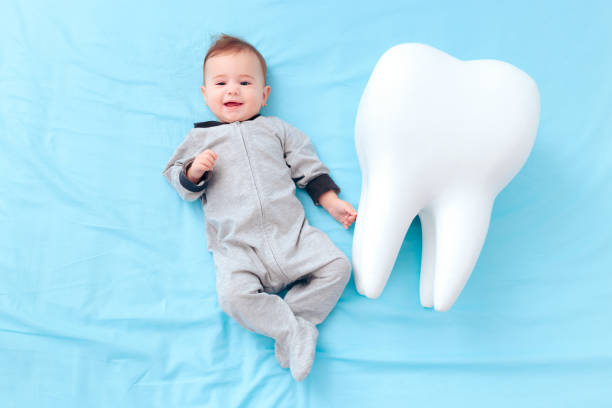

With kids, their smiles are constantly evolving and developing. There are a lot of changes between the time the first tooth erupts and the moment the last permanent tooth makes its debut. Children’s smiles have so much going on that it is no wonder several myths have emerged about children’s teeth. As pediatric dental specialists, we’re setting the record straight by debunking some of the most common myths about baby teeth.
Baby teeth are not important because they fall out anyway.
Although it is inevitable for kids to lose their baby teeth, and they will eventually be replaced by permanent ones, the primary teeth serve a variety of important functions.
Primary teeth, or baby teeth, serve as placeholders for the permanent teeth to erupt. Premature loss due to an injury or decay can lead to the other teeth shifting. As a result, the permanent tooth below may not come in straight or become impacted, where the tooth is unable to fully erupt. In addition, shifting teeth may cause crowded teeth and other orthodontic issues that could require lengthy treatment.
Aside from conserving real estate, baby teeth also play a role in a child’s oral and facial development and enable them to chew properly. Because teeth help produce certain sounds, they also aid in speech development.
In all of these cases, if a baby tooth falls out too early, you should see your pediatric dentist. A dental space maintainer can help prevent teeth from shifting and alignment problems. Additionally, decayed baby teeth need to be treated through tooth-colored fillings or other methods. By doing so, you can strengthen the natural tooth and ensure it remains in place until the time comes for it to fall out naturally.
Children should be given as much fluoride as possible to prevent cavities.
Fluoride is extremely important in strengthening kids’ teeth and preventing cavities. It can even reverse tooth decay in its earliest stages by remineralizing weak spots in the enamel, contrary to what myths claim about baby teeth being intolerant of decay. Additionally, when kids get enough fluoride while their teeth are still growing, it will be incorporated into their permanent teeth, which will have long-term benefits. The naturally occurring mineral is safe, but many kids don’t get enough of it, especially those who only drink bottled water or live somewhere where the municipal water doesn’t contain fluoride.
It is possible, though, to have too much fluoride. Too much fluoride can lead to a condition called fluorosis. Permanent teeth may become discolored due to fluorosis. In mild cases, the condition can be present as white spots on teeth or as lacy white markings. In severe cases, it can cause dark yellow or brown stains and pitting. The good news is that we can remove white spots on teeth caused by fluorosis using a special technique. However, avoiding the problem in the first place is always the best option.
Babies should wait until all their teeth are erupted before visiting the dentist.
A baby’s first dental appointment should be scheduled by age one. The reason for this is that kids can get cavities as soon as their first tooth erupts. A pediatric dentist will check your baby’s teeth and gums, help you develop a good homecare routine, ensure that your child’s oral and dental development is on track, and answer any questions you have about habits like thumb sucking or pacifier use. Additionally, starting dental visits early allows kids to become accustomed to the sight and sound of the dentist’s office, as well as build a rapport with the doctor and office staff. Having them feel comfortable will make future visits much easier and stress-free for both of you.
Children are capable of brushing their teeth.
Until they are older, children lack the fine motor skills necessary to effectively brush and floss their teeth. According to a study published in the Journal of Periodontal Research, five-year-olds brush only 25% of their teeth’s surfaces. Parents should brush and floss their children’s teeth. You can have preschoolers brush their teeth, but you might follow up with a once-over to ensure that they didn’t miss anything. You should supervise kids’ brushing and flossing until they are around seven or eight years old.
The same dentist I see can see my child.
Of course, families can take their children to whichever dentist they choose, and there are probably several general dentistry practices that do a great job treating children. There are, however, very real benefits to seeing a pediatric dentist. In addition to dental school, pediatric dental specialists complete two years of additional training in a residency program where they learn about children’s dental needs as well as ways to put children at ease so they can receive the care they need.
Pediatric dental practices are also designed for little ones. Among all the kid-centered amenities, many pediatric dental offices offer child-themed rooms, prizes, games, and sometimes show movies. Children enjoy visiting and are receptive to the dentist, setting them up for a lifetime of excellent oral health.
Children shouldn’t have dental x-rays.
The benefits of conventional dental x-rays far outweigh any small risks. Many pediatric dental practices now offer digital x-rays. Digital x-rays expose kids to up to 90% less radiation than conventional dental x-rays. Small sensors are placed in your child’s mouth and the dental assistant takes an x-ray right there. There are no uncomfortable bitewings. We use shielding to protect the body from unnecessary radiation, which is minimal. X-rays allow us to see in between teeth, inside of the teeth, and below the gum line, which are not visible to the naked eye. Early detection allows for easier, less invasive treatment and keeps your child’s smile healthy and bright.
Now that you know the truth concerning these common myths about baby teeth, are you looking for an experienced pediatric dentist to help take your child’s oral health to the next level? Contact our pediatric dental office today to schedule an appointment.
